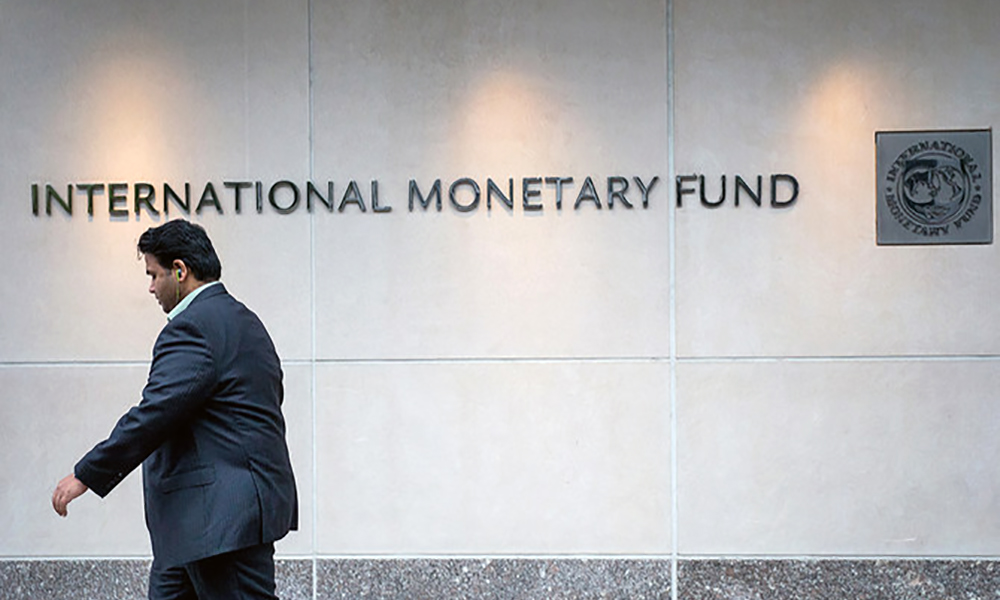World
IMF board releases over $1.1 billion in Pakistan bailout funds

The International Monetary Fund (IMF) board approved the seventh and eighth reviews of Pakistan’s bailout programme, allowing for a release of over $1.1 billion to the cash-strapped economy, the fund and the government said on Monday.
The IMF agreed to extend the programme by a year and increase the total funding by about $940 million as per the current exchange, Reuters reported.
The funds will be a lifeline to the South Asian country suffering from devastating floods which have inflicted damage of at least $10 billion according to the country’s planning minister.
In a statement, IMF Deputy Managing Director Antoinette Sayeh said adhering to scheduled increases in fuel levies and energy tariffs is “essential” as Pakistan’s economy “has been buffeted by adverse external conditions.”
These include “spillovers from the war in Ukraine, and domestic challenges, including from accommodative policies that resulted in uneven and unbalanced growth,” he noted.
The floods were not mentioned in the fund’s statement.
Pakistan’s foreign exchange reserves have fallen to levels that cover only a month of exports and its economy is wrangled with a massive current account deficit and high inflation.
The Extended Fund Facility (EFF) programme was initially for 36 months and worth $6 billion at the time of its approval in 2019. It had stalled since earlier this year as Islamabad struggled to meet targets set by the lender, Reuters reported.
The IMF board also approved Pakistan’s request for waivers related to the country’s failure to meet some of the programme’s criteria.
Ismail also said government efforts to get the programme back on track via painful corrective economic measures had saved Pakistan from default.
The go-ahead from the IMF board will open other multilateral and bilateral avenues of funding for Pakistan, which were awaiting a clean bill of health from the lender.
World
In Beijing, Blinken meets Xi and raises US concerns about China’s support for Russia

U.S. Secretary of State Antony Blinken raised concerns on Friday about China’s support for Russia’s military, one of the many issues threatening to sour the recent improvement in relations between the world’s biggest economies.
Blinken raised the matter during five-and-a-half hours of talks with China’s top diplomat Wang Yi in Beijing, the latest high-level contact between the countries that have reduced the acrimony that pushed ties to historic lows last year.
The U.S. diplomat is due to wrap up his visit on Friday with little progress on a raft of contentious issues including U.S. complaints about cheap Chinese exports. Instead, both sides are focusing on pragmatic issues like people-to-people exchanges.
“The Secretary discussed concerns about PRC support to the Russian defense industrial base,” U.S. State Department spokesperson Matthew Miller said, adding the two sides also discussed Taiwan, the South China Sea and other flashpoints.
The PRC is short for China’s official name, the People’s Republic of China.
Despite its “no limits” partnership with Moscow, China has steered clear of providing arms for Russia’s war in Ukraine.
But U.S. officials warn its companies are helping the weapons industry with an unprecedented build up that has helped to turn the tide of the war. For example, bigger machine tool imports from China have helped Russia increase its ballistic missile production, they say.
The U.S. officials say such assistance risks hurting the broader bilateral relationship, even as ties stabilise after being hit by then-House Speaker Nancy Pelosi’s visit to Taiwan in 2022 and the U.S. downing of a suspected Chinese surveillance balloon in February 2023.
China has said it has not provided weaponry to any party, adding that it is “not a producer of or party involved in the Ukraine crisis”. However, it says that normal trade between China and Russia should not be interrupted or restricted.
STEADYING THE SHIP
In addition to his talks with Wang, Blinken met Chinese President Xi Jinping, who reiterated Beijing’s concerns that the United States was suppressing its economic development.
“This is a fundamental issue that must be addressed, just like the first button of a shirt that must be put right, in order for the China-U.S. relationship to truly stabilise, improve and move forward,” Xi said.
Earlier, Wang told Blinken that the “giant ship” of the China-U.S. ties had stabilised, “but negative factors in the relationship are still increasing and building.”
Wang also said the U.S. had taken “endless” measures to suppress China’s economy, trade, science and technology, equating such steps to containment.
“And the relationship is facing all kinds of disruptions. China’s legitimate development rights have been unreasonably suppressed and our core interests are facing challenges,” Wang told Blinken.
The agenda for the talks had been set during the November summit between Biden and Xi in San Francisco and a follow-up call in April.
Underscoring the growing discord between the two sides, hours before Blinken landed in China on Wednesday, U.S. President Joe Biden signed a bipartisan bill that included $8 billion to counter China’s military might, as well as billions in defence aid for Taiwan and $61 billion for Ukraine.
Wang said the U.S. must not step on “red lines” covering sovereignty, security and development interests – an apparent reference to Taiwan, the democratically governed island that China claims as its own, and the disputed South China Sea.
Other issues on the table include artificial intelligence and the U.S. push for progress on the curbing of China’s supply of the chemicals used to make fentanyl.
Blinken, along with senior U.S. officials focused on anti-narcotics collaboration with China, met China’s minister of public security, Wang Xiaohong, to discuss the fentanyl issue.
Ahead of Friday’s talks, U.S. Treasury Secretary Janet Yellen signalled that Biden was not taking any options off the table to respond to China’s excess industrial capacity.
Wang said that the U.S. should stop “hyping up” the “false narrative” of China’s overcapacity.
(Reuters)
World
US student protests over Gaza intensify despite arrests

Students at a growing number of U.S. colleges continue to gather in pro-Palestinian encampments with a unified demand that Israel end its war on Gaza and that universities to divest from companies with ties to Israel.
So far, police have arrested hundreds of student protesters at numerous colleges, including the University of Southern California, University of Texas at Austin, and Columbia University in New York, among others.
The growing unrest on college campuses is also accompanied by a rise in antisemitism.
CNN reports that antisemitic acts have surged across America and particularly on campuses since October 7.
Islamophobia has also run rampant.
The recent surge in protests have in turn inflamed tensions, forcing leadership to decide when free speech on campus crosses a line and becomes threatening, CNN reports.
Several colleges have called the police on protesters, leading to the arrests of hundreds across multiple campuses.
On Wednesday, at the University of Texas at Austin, state troopers in riot gear, including some on horseback, began breaking up a group of protesters shortly after a demonstration.
The arrests on Wednesday in cities of Austin and Los Angeles came as students at Harvard University and Brown University on the east coast also defied threats of action and set up encampments in solidarity with Palestinians in Gaza.
Al Jazeera reported that protesters at Columbia University, the epicenter of demonstrations that began last week, said they won’t disperse until the school agrees to cut ties with Israeli universities and commits to divesting funds from Israel-linked entities, among other demands.
Tensions on multiple US campuses were sparked after Hamas’ October 7 attack, where militants killed about 1,200 people and took over 200 hostages. Israel retaliated on Gaza and has over the past six months killed more than 34,000 people.
When did the current conflict start?
CNN reports that the situation escalated last week at Columbia University when the university’s president, Nemat “Minouche” Shafik, testified before a House committee about the school’s response to charges of campus antisemitism. A pro-Palestinian protest kicked off on campus at the same time.
Following her testimony, Shafik requested in a letter released by the university that the New York City Police Department remove people who were encamped on the South Lawn of the campus who were “in violation of the University’s rules and policies” and trespassing.
More than 100 people were arrested.
The encampments were organized by Columbia University Apartheid Divest (CUAD), a student-led coalition of more than 100 organizations, to protest what they describe as the university’s “continued financial investment in corporations that profit from Israeli apartheid, genocide, and military occupation of Palestine.”
Since last Thursday, other college campuses have faced similar protests and encampments, as well as arrests.
Pro-Palestinian encampments have been set up at the Massachusetts Institute of Technology, Emerson College, the University of Texas at Austin, the University of Michigan and the University of California, Berkeley. On Wednesday, police arrested nearly 100 protesters at the University of Southern California after a dispersal order.
Yale University police arrested at least 45 protesters Monday while Harvard University closed Harvard Yard and officials at the school suspended a pro-Palestinian student organization for allegedly violating school policies, CNN reported.
World
Israel says it is poised to move on Rafah

Israel’s military is poised to evacuate Palestinian civilians from Rafah and assault Hamas hold-outs in the southern Gaza Strip city, a senior Israeli defence official said on Wednesday, despite international warnings of a humanitarian catastrophe, Reuters reported.
A spokesperson for Prime Minister Benjamin Netanyahu’s government said Israel was “moving ahead” with a ground operation, but gave no timeline.
The defence official said Israel’s Defence Ministry had bought 40,000 tents, each with the capacity for 10 to 12 people, to house Palestinians relocated from Rafah in advance of an assault.
Video circulating online appeared to show rows of square white tents going up in Khan Younis, a city some 5 km (3 miles) from Rafah. Reuters could not verify the video but reviewed images from satellite company Maxar Technologies which showed tent camps on Khan Younis land that had been vacant weeks ago.
An Israeli government source said Netanyahu’s war cabinet planned to meet in the coming two weeks to authorise civilian evacuations, expected to take around a month, read the report.
The defence official, who requested anonymity, told Reuters that the military could go into action immediately but was awaiting a green light from Netanyahu.
Rafah, which abuts the Egyptian border, is sheltering more than a million Palestinians who fled the half-year-old Israeli offensive through the rest of Gaza and say the prospect of fleeing yet again is terrifying.
“I have to make a decision whether to leave Rafah because my mother and I are afraid an invasion could happen suddenly and we won’t get time to escape,” said Aya, 30, who has been living temporarily in the city with her family in a school.
She said that some families recently moved to a refugee camp in coastal Al-Mawasi, but their tents caught fire when tank shells landed nearby. “Where do we go?”
HITTING HARD
Israel, which launched its war to annihilate Hamas after the Islamist group’s Oct. 7 attacks on Israeli towns, says Rafah is home to four Hamas combat battalions reinforced by thousands of retreating fighters, and it must defeat them to achieve victory.
“Hamas was hit hard in the northern sector. It was also hit hard in the centre of the Strip. And soon it will be hit hard in Rafah, too,” Brigadier-General Itzik Cohen, commander of Israel’s 162nd Division operating in Gaza, told Kan public TV.
But Israel’s closest ally Washington has called on it to set aside plans for an assault, and says Israel can combat Hamas fighters there by other means.
“We could not support a Rafah ground operation without an appropriate, credible, executable humanitarian plan precisely because of the complications for delivery of assistance,” David Satterfield, U.S. special envoy for Middle East humanitarian issued, told reporters on Tuesday.
“We continue discussions with Israel on what we believe are alternate ways of addressing a challenge which we recognise, which is Hamas military present in Rafah.”
Egypt says it will not allow Gazans to be pushed across the border onto its territory. Cairo had warned Israel against moving on Rafah, which “would lead to massive human massacres, losses (and) widespread destruction”, its State Information Service said.
Three Egyptian security sources said that military and security coordination between Egypt and Israel over any Israeli incursion into Rafah did not mean approval of it, Reuters reported.
Egypt welcomed the return of Palestinians northwards from Rafah, believing it to be in the interest of the population despite also serving Israeli plans to besiege Hamas in Rafah, the sources added.
Israel has withdrawn most of its ground troops from southern Gaza this month but kept up air strikes and conducted raids into areas its troops abandoned. Efforts by the United States, Egypt and Qatar to broker an extended ceasefire in time to head off an assault on Rafah have so far failed.
Gaza medical officials say than 34,000 people have been killed in Israel’s military campaign, with thousands more bodies feared buried under rubble.
Hamas killed 1,200 people and abducted 253 on Oct 7, according to Israeli tallies. Of those hostages, 129 remain in Gaza, Israeli officials say. More than 260 Israeli troops have been killed in ground fighting since Oct 20, the military says.
H. A. Hellyer, a senior associate fellow in international security studies at the Royal United Services Institute, said he expected the assault on Rafah “sooner rather than later” because Netanyahu is under pressure to meet his stated objectives of rescuing hostages and killing all the Hamas leaders.
“The invasion of Rafah is unavoidable because of the way he has framed all of this,” he said. But it will not be possible for everyone to leave the city, so “if he sends the military into Rafah, there are going to be a lot of casualties”.
-

 Latest News3 days ago
Latest News3 days agoRashid Khan named AWCC’s brand ambassador
-

 Regional4 days ago
Regional4 days agoIranian president lands in Pakistan for three-day visit to mend ties
-

 Sport4 days ago
Sport4 days agoKolkata beat Bengaluru by one run in IPL as Kohli fumes at dismissal
-

 Sport4 days ago
Sport4 days agoACL: Aino Mina 3-0 Istiqlal Kabul; Attack Energy 3-0 Khadim
-

 Climate Change4 days ago
Climate Change4 days agoRescuers race to reach those trapped by floods in China’s Guangdong
-

 Business5 days ago
Business5 days agoAfghanistan, Kazakhstan to hold joint expo in Kabul
-

 World3 days ago
World3 days agoMalaysian navy helicopters collide in mid-air, 10 killed
-

 Sport3 days ago
Sport3 days agoJaiswal ton powers Rajasthan to big IPL win
























